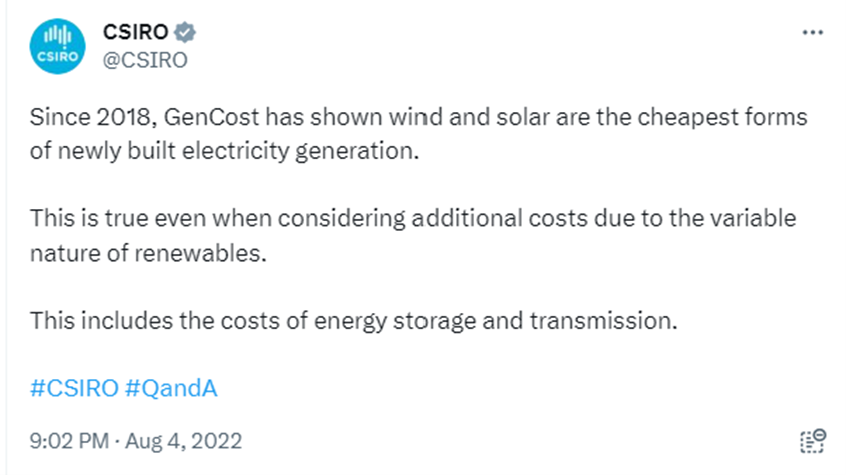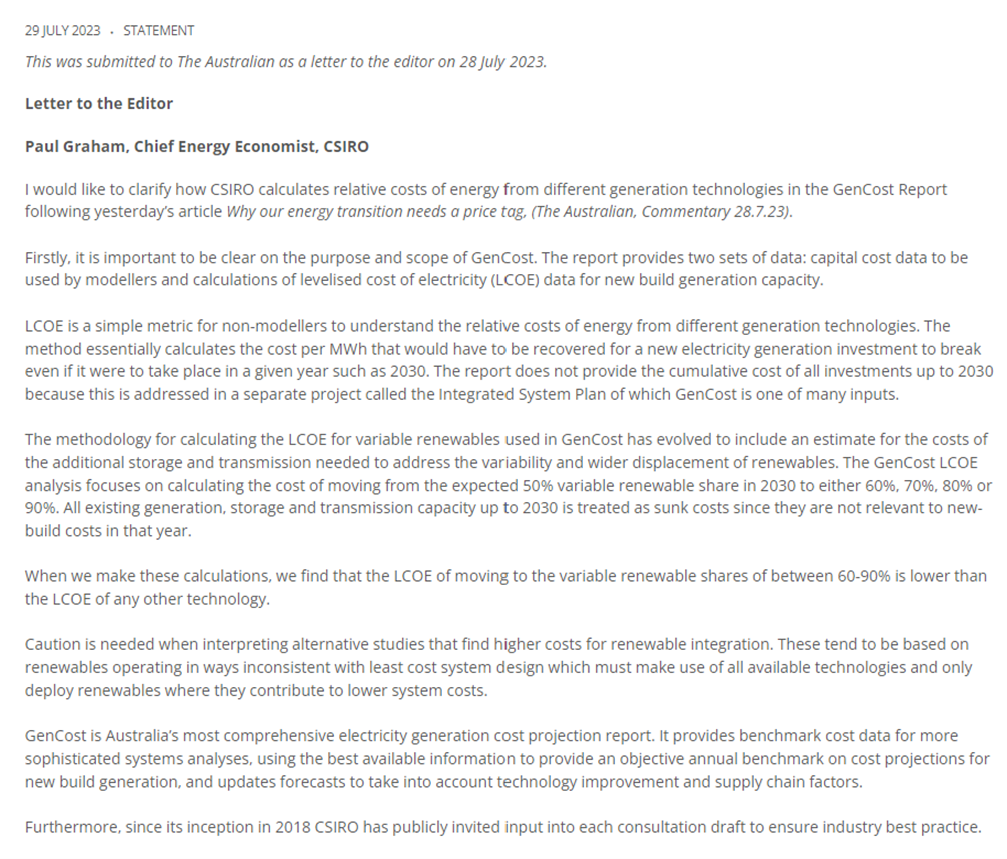Dear Reader,
The shift to cleaner energy isn’t advocated on climate change grounds alone.
Yes, the 2022 Intergovernmental Panel on Climate Change Sixth Assessment Report said ‘climate change is a threat to well-being and planetary health’. A threat that can be assuaged by phasing out fossil fuels.
But the push for net zero emissions has economic backing, too.
Clean sources of energy are also advocated for on the grounds they’re cheaper.
The Greens, for instance, write on their website that ‘renewables are the cheapest form of power’.
And late last year, Australia’s very own climate change minister Chris Bowen said in a speech:
‘This transition is even more important – not only for reasons of climate, as compelling as those reasons are – but also because renewable energy is the cheapest form of energy, which is rather handy in an affordability crisis.’
Even former federal Liberal party MP Dave Sharma said in 2021 that the ‘lowest cost of new energy generation sources is renewable energy’.
But it’s not just politicians.
Hardened, profit-maximising businesses agree.
In February 2022, Origin Energy’s CEO Frank Calabria announced Origin’s early exit from coal-fired generation.
A big reason was the improved economics of renewable energy:
‘The reality is the economics of coal-fired power stations are being put under increasing, unsustainable pressure by cleaner and lower cost generation, including solar, wind and batteries.
‘The cost of renewable energy and battery storage is increasingly competitive, and the penetration of renewables is growing and changing the shape of wholesale electricity prices, which means our cost of energy is expected to be more economical through a combination of renewables, storage and Origin’s fleet of peaking power stations.’
And, of course, we have Twiggy Forrest’s Fortescue Metals.
Fortescue is investing heavily in green energy technology, siphoning chunks of FMG’s iron ore profits to fund green energy investments.
In December 2022, Forrest told the Australian Financial Review:
‘The more you use fossil fuels, the more expensive and dangerous it becomes. The more you use renewable energy, the cheaper it becomes, and the more democratic it becomes and the higher everyone’s standard of living.’
CSIRO’s influential GenCost report
A big reason why renewables are regarded as the cheapest forms of energy is a landmark costings report conducted by Australia’s premier science body — CSIRO.
Since 2018, CSIRO has been calculating the costs of different energy sources, consistently finding that wind and solar are ‘the cheapest forms of newly built electricity generation’.

Source: CSIRO on Twitter
These finding reside in the annually updated GenCost report, a collaboration between CSIRO and the Australian Energy Market Operator.
The GenCost report is the go-to reference on the question of what energy source is cheapest.
Take AAP FactCheck, the fact checking arm of Associated Press.
A few years ago, it ran an investigation on whether renewable energy really is the cheapest source of new power generation.
What did AAP FactCheck rely on?
The GenCost report.
AAP FactCheck’s verdict:
‘Current estimates, contained in GenCost’s latest draft report, show renewables are cheaper to deploy in Australia with or without a price on carbon or risk premium for fossil fuel sources. Independent experts and other research support its findings.’
What if the CSIRO’s GenCost report is flawed?
But what if the GenCost report is flawed?
What if some of its assumptions are iffy?
Would scrutiny of its modelling warrant scepticism of its conclusions?
If we find out how the GenCost sausage was made, will we still have an appetite?
According to recent reporting from The Australian, the GenCost report has ‘received surprisingly little scrutiny in the public arena’.
But given GenCost’s eminence grise role in energy policy, a lack of scrutiny ‘may lead to policy disaster’.
As Claire Lehmann wrote last month in The Australian:
‘Nevertheless, some experts do not hold back in their criticism. Stephen Wilson, from the School of Mechanical & Mining Engineering at the University of Queensland, told me in an email that the GenCost report is “inaccurate and misleading on total system costs”.
In a submission to Treasury earlier this year, energy economist David Carland points out that the report says nothing about the cost of “firming” of renewables and instead estimates the cost of “integrated” renewables from 2030 onwards — relying on the flawed assumption that firming has already taken place. But the most pointed criticism of GenCost has emerged this week from a Sydney-based data scientist.’
The most vocal scrutineer of the report is data scientist Aidan Morrison, whom Greg Canavan spoke to in the latest episode of What’s Not Priced In.
Morrison argues GenCost’s modelling rests on an inappropriate use of the ‘sunk cost’ assumption.
Sunk costs are costs beyond recovery at the moment a decision is made. A basic example is money already spent on nonrefundable tickets.
But as Lehman, voicing Morrison’s critique, explains:
‘By definition, costs that have not been incurred yet are avoidable, and are not yet sunk. This is common sense but, in the GenCost report, the CSIRO treats future spending on renewables as sunk — even before the spending has occurred — allowing the analysis to exclude this expenditure from the total cost of renewables.
‘This creative accounting method is how the GenCost report arrives at the conclusion that “integrated renewables” are the cheapest form of energy by 2030 onwards.
Morrison’s criticisms, and Lehman’s coverage, prompted a response from CSIRO’s chief economist, Paul Graham.
Graham admitted GenCost modelling ‘does not provide the cumulative cost of all investments up to 2030 because this is addressed in a separate project called the Integrated System Plan of which GenCost is one of many inputs’.

Source: CSIRO
Yet Morrison argues even the mentioned Integrated System Plan has issues.
As Greg told viewers, if Morrison is right, ‘then what is happening with Australia’s energy transition is truly shocking’.
You can watch the full interview below.

Regards,
Kiryll Prakapenka
Editor, Money Morning

